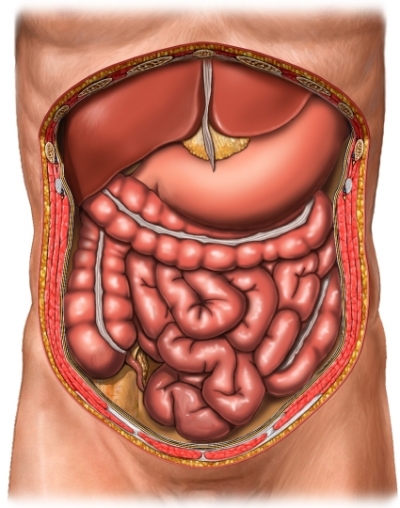Gastrectomy – Removal of the stomach
Description gastrectomy
Gastrectomy – operation to remove all or part of the stomach.

Reasons for gastrectomy
Gastrectomy is most often done to treat stomach cancer. Currently this is the only way to cure this disease. Application Chemotherapy and exposure after surgery reduces the risk of recurrence. Even if cancer has already developed, gastrectomy help prevent bleeding, obstruction and pain.
In addition to treating stomach cancer, this surgery may also be done to treat these disorders:
- Peptic ulcer disease;
- Bleeding;
- Inflammation;
- Benign tumors of the stomach.
Possible complications of gastrectomy
If you plan to gastrectomy, you need to know about possible complications, which may include:
- Damage to nearby organs;
- Leaks of the new joints between the stomach and the intestines and / or esophagus;
- Infection;
- Bleeding;
- Education hernia at the incision site;
- Blood clots;
- Reaction to anesthesia.
Factors, that may increase the risk of complications:
- Obesity;
- Advanced age;
- Smoking;
- Poor diet;
- Respiratory diseases and heart disease.
How is gastrectomy?
Preparation for the procedure
It can be assigned the following:
- Inspection;
- Blood tests;
- Fecal occult blood test – test, to check for blood in the stool;
- Endoscopy – procedure, which uses a flexible tube with a camera on the end of the study for the gastrointestinal tract;
- Radiopaque barium study – X-rays of the esophagus, stomach, bowel during and after administration of barium;
- CT scan – such as X-rays, which uses computer, to make pictures of structures inside the body.
In the run-up procedure:
- Consult your doctor about the drugs taken. A week before surgery you may be asked to stop taking some medicines:
- Anti-inflammatory drugs (eg, aspirin);
- Blood thinners, such as clopidogrel (Plaviks) or warfarin;
- Your doctor may recommend:
- Go to a special diet;
- Take antibiotics;
- Take a shower the night before your surgery using antibacterial soap;
We need to organize a trip to the procedure and back. Besides, take care of the home care.
On the eve of the operation in the evening you can eat a light meal. Do not eat or drink anything after midnight.
Anesthesia
Used general anesthesia, which blocks any pain and the patient support in a sleep state during operation.
Procedure removal of the stomach
The doctor makes an incision in the abdominal cavity. Furthermore it will use surgical instruments to remove all or part of the stomach. If only a portion of the stomach is removed, it is called partial gastrectomy. With this type of surgery, the doctor will connect the remaining part of the stomach to the esophagus and the small intestine.
If the operation is carried out for treatment of peptic ulcer, nerves, responsible for acid production can also be removed.
If the whole stomach removed, operation is called total gastrectomy. The doctor will try to create a new “stomach” via intestinal tissue. At the end of the esophagus will be attached to the small intestine.
In gastric cancer, doctor, probably, also remove lymph nodes, because cancer can spread through the lymphatic system.
After the operation the doctor stitches the muscles and skin of the abdomen or staple sutures. At the end of the cut in the bandage.
How long will the removal of the stomach?
1-3 o'clock (or more).
Removal of the stomach – Will it hurt?
The pain is felt during recovery. The doctor prescribe pain medication.
The average hospital stay
This operation is performed in a hospital. Usually the duration of stay of 6-12 days. The doctor can extend the stay, If there are complications.
Care after the removal of the stomach
Your doctor will tell you:
- When and what you can eat;
- Do you need to limit activity.
Ask the doctor, when it is safe to shower, bathe, or to expose the cut by water;
During the first few days after surgery,, you may be limited in food. When the stomach is stretched, you will be able to eat more at a time. If carried out a total gastrectomy, you need to eat small amounts of food more often.
Following operations can be:
- Frequent heartburn;
- Abdominal pain;
- Vitamin deficiencies.
To treat these symptoms physician:
- Prescribe medication and vitamin supplements;
- Make changes in diet.
Be sure to follow your doctor's instructions.
Contact your doctor after removal of the stomach
After returning home, you need to see a doctor, If the following symptoms:
- Signs of infection, including fever and chills;
- Redness, edema, increased pain, bleeding or any discharge from the incision;
- Nausea and / or vomiting, which do not disappear after taking the prescribed medicines, and persist for more than two days after discharge from the hospital;
- Pain, which does not pass after taking pain medication appointed;
- Pain and / or swelling of the legs, calves and feet;
- Pain, burning, frequent urination or persistent blood in the urine;
- Cough, shortness of breath or chest pain.
